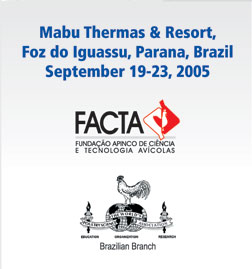Contributed Papers: Oral Presentations
Cell Biology |
Characterisation
of Apical Membrane Antigens in Eimeria tenella
Karen Billington1, David
Ferguson2 and Fiona Tomley1
1Institute for Animal Health, Compton. 2John Radcliffe
Hospital, Oxford
Apical membrane
antigen 1 (AMA-1) was first identified within the
blood stages of Plasmodium knowlesi as a target of
invasion inhibitory monoclonal antibodies and homologous
proteins are conserved in other species of malaria
parasites and in Toxoplasma gondii. AMA-1 is a transmembrane
protein that is secreted from the microneme organelles
during invasion onto the parasite surface from where
it is proteolytically cleaved by a muti-functional
membrane-bound serine proteinase that is also responsible
for the shedding of other parasite surface molecules.
We have
identified two Eimeria tenella homologues of AMA-1
with all the characteristic hallmarks of the AMA-1
family including N-terminal signal peptides, extracellular
domains organised around 16 conserved cysteines and
C-terminal transmembrane and cytoplasmic domains.
EtAMA-1 is expressed exclusively within the sporozoite
stage of the parasite and EtAMA-2 is expressed only
within the merozoite stages. Further studies to examine
the secretion and processing of these molecules are
underway.
